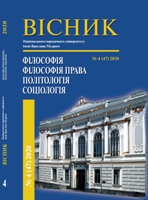О ПОНИМАНИИ ДОКАЗАТЕЛЬСТВА В АНГЛО -АМЕРИКАНСКОМ ПРАВЕ
ON COMPREHENSION OF PROOF IN ANGLO-AMERICAN LAW
Author(s): Alexander Vladimirovich TiagloSubject(s): Analytic Philosophy, Philosophy of Science, Philosophy of Law, Philosophy of History
Published by: Національний юридичний університет імені Ярослава Мудрого
Keywords: proof; judicial proof; logical proof; standard of proof; proof beyond reasonable doubt; Anglo-American law; Black's Law Dictionary;
Summary/Abstract: Problem setting and objectives. Concept of proof beyond reasonable doubt was introduced to the Ukrainian law in 2012 only. In order to grasp and use this innovation properly, evolution and current state of general comprehension of proof in Anglo-American law is studied. For this, a comparative analysis of similar fragments from several Black's Law Dictionary editions (1891 - 2009) is performed. Paper main body. Cluster of terms (and relevant concepts), by which proof in law, or judicial proof, is expressed (and comprehended), includes now «proof» and «evidence», «to prove» and «to evidence», «burden of proof», «standard of proof», «standard of proof beyond reasonable doubt», «standard of proof by preponderance of evidence», «standard of proof by clear and convincing evidence», as well «truth» and «belief» coupled with «conviction», «to convince», «to persuade», and so on. This cluster was formed and has been evolving all time in at least three dimensions: logical, juridical, and rhetorical. At that, the rhetorical dimension significance has been rising through partial extrusion of the logical one. Respectively, although concept of the judicial proof remains akin to its analogue in logics yet, but it has been moving increasingly away from it. On this way, the judicial proof concept lost – as necessary components of its content – immanent features of the logical proof, namely, truth of evidence in premises and necessary logical connection between whole body of the evidence and conclusion. Concept of standard of proof undergone significant change as well: now it divides into three main species concepts that depend on the cases nature. Even that concept, which corresponds to criminal cases and supposes the most difficult requirements, do not require truth or absolute certainty of the belief induced, agreeing only on absence of reasonable doubt, which by nature is subjective and practically never avoid some rhetorical influence. Conclusions of the research. The judicial proof was transformed from activity purposed by essence at formally correct establishment of truth, which in principle does not require more than one thinking person, into organized legal communication of two or more persons, principal purpose of which is to induce desirable belief in minds of the persons to whom relevant conviction is addressed. The proof has been evolving all time in at least three variable dimensions: logical, juridical, and rhetorical.
Journal: Вісник НЮУ імені Ярослава Мудрого. Серія: Філософія, філософія права, політологія, соціологія
- Issue Year: 47/2020
- Issue No: 4
- Page Range: 8-23
- Page Count: 16
- Language: Russian

